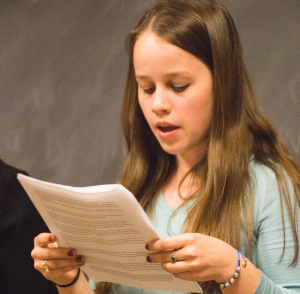
Sarah Rabon (COL ’16) reading stories from sexual assault survivors at “It Happens Here” during last year’s Take Back the Night week.
The White House and Center for American Progress’s Generation Progress, an organization promoting awareness of on-campus sexual assault, launched the public awareness campaign “It’s On Us” last week as part of the Obama administration’s continued efforts to prevent sexual violence at the nation’s universities.
Georgetown joined the list of nearly 200 universities nationwide whose student leaders have agreed to promote the campaign against sexual assault on their respective campuses.
“At Georgetown our work for many years on this issue has been guided by our commitment to cura personalis, care of the whole person — mind, body, and spirit. Educating and engaging our community on this issue is an essential part of our responsibility to uphold the moral expectations that have guided us throughout our history as a Jesuit institution,” University President John J. DeGioia wrote in a university-wide email.
Tina Tchen, executive director of the White House Council on Women and Girls and chief of staff to the first lady, stressed the importance of spreading sexual assault awareness at universities.
“Everyone has the right to live free from the threat of sexual assault,” Tchen said in a conference call with college media Monday. “Still today, one in five women will be sexually assaulted while in college.”
The campaign named four goals for colleges: distributing campus climate surveys to assess the extent of the problem on their campuses, preventing sexual assault, responding effectively when assault occurs and increasing transparency on enforcement efforts.
“Our goal of this campaign is to both change culture nationally but also to empower students on local campuses to be able to create campaigns and engage new people in the fight to end campus sexual assault,” said Anne Johnson, executive director of Generation Progress, a nonprofit organization that advocates for social and political policy through student leaders on college campuses and a co-sponsor of the campaign, said on the call.
“It’s On Us” will focus on engaging students and promoting better recognition of the problems of sexual assault. The campaign asked students to sign an online pledge in order to create an environment that does not tolerate sexual assault. More than 37,000 people have taken the pledge so far.
“Bystanders play a key role in preventing, discouraging, and/or intervening when an act of violence has potential to occur,” Tchen said.
Take Back the Night President Sarah Rabon (COL ’16) was wary that the pledge could have the opposite effect.
“Campaigns like this can sometimes provide rationalizations for complacency,” Rabon said. “The act of signing the pledge may cause someone to feel as if they’ve effectively done their part, but in reality, the epidemic of sexual assault is one that will only be resolved after a long period of hard work by many.”
In addition to the pledge, the Department of Justice Office on Violence Against Women gave $6 million to 18 colleges to develop programs on prevention and response to sexual assault. Johnson said the mission of the program was a holistic change in the response to sexual assault at universities.
“This is an ‘all hands on deck’ kind of campaign, and we are really going to change the way that we think about campus sexual assault,” Johnson said. “We need to engage media entities, domestic violence prevention groups, sports organizations and campus groups.”
Despite this increased push, the organizers have struggled to involve men in the conversation, one of the primary goals of the campaign.
“A lot of men are really uncomfortable with sexual assault, but they don’t speak up because they think that other men approve of this kind of behavior, when in fact they don’t,” Johnson said.
“It’s On Us” plans to educate children in grades K-12, engaging them in age-appropriate conversations to emphasize the problem. Rabon stressed the importance of beginning education against sexual assault culture at a young age.
“Conversations around consent, bystander intervention and supporting survivors could be normalized and deepened if we, as a society, had them earlier and more often,” she said.
Georgetown recently updated its sexual misconduct policy, following guidelines set by the White House’s Task Force to Protect Students from Sexual Assault, which was formed in January. The changes allow sexual assault survivors to avoid face-to-face interactions with their perpetrators during hearings, limit the number of people involved in a case and force the university to assign outside investigators to examine the cases.
Georgetown’s Sexual Assault Services Specialist Bridget Sherry Laizer praised student sexual assault peer educators for their influence in promoting positive change.
“SAPE students played a critical role last year in many of the new policy changes that came about, including the Survivor Bill of Rights and addition of a new clinical staff member in Health Education Services for Sexual Assault Services,” Laizer said.
Rabon emphasized the necessity of individual action, in addition to the White House campaign and administrative changes, to create a safer environment and prevent sexual assault.
“Day-to-day efforts should be taken by students to make this campus safer for all students, as people of all genders are affected by sexual assault. A primary tool students can use is bystander intervention,” Rabon said. “If students both look out for each other and refuse to passively accept displays of predatory behavior by others, this campus can become much safer for everyone.”














